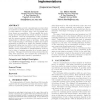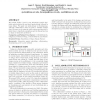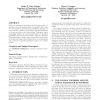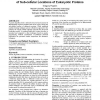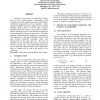746 search results - page 26 / 150 » Short Term Unit-Commitment Using Genetic Algorithms |
131
click to vote
SIGADA
2004
Springer
15 years 7 months ago
2004
Springer
Genetic Algorithms provide computational procedures that are modeled on natural genetic system mechanics, whereby a coded solution is “evolved” from a set of potential solutio...
104
click to vote
GECCO
2008
Springer
15 years 3 months ago
2008
Springer
We present IGAP, a peer to peer interactive genetic algorithm which reflects the real world methodology followed in team design. We apply our methodology to floorplanning. Throu...
119
click to vote
GECCO
2009
Springer
15 years 8 months ago
2009
Springer
When an optimization problem is encoded using genetic algorithms, one must address issues of population size, crossover and mutation operators and probabilities, stopping criteria...
127
click to vote
GECCO
2008
Springer
15 years 3 months ago
2008
Springer
A genetic algorithm (GA) is utilised to discover known and novel PROSITE-like sequence templates that can be used to classify the sub-cellular location of eukaryotic proteins. Whi...
125
click to vote
CAINE
2003
15 years 3 months ago
2003
Clustering is the process of subdividing an input data set into a desired number of subgroups so that members of the same subgroup are similar and members of different subgroups h...
